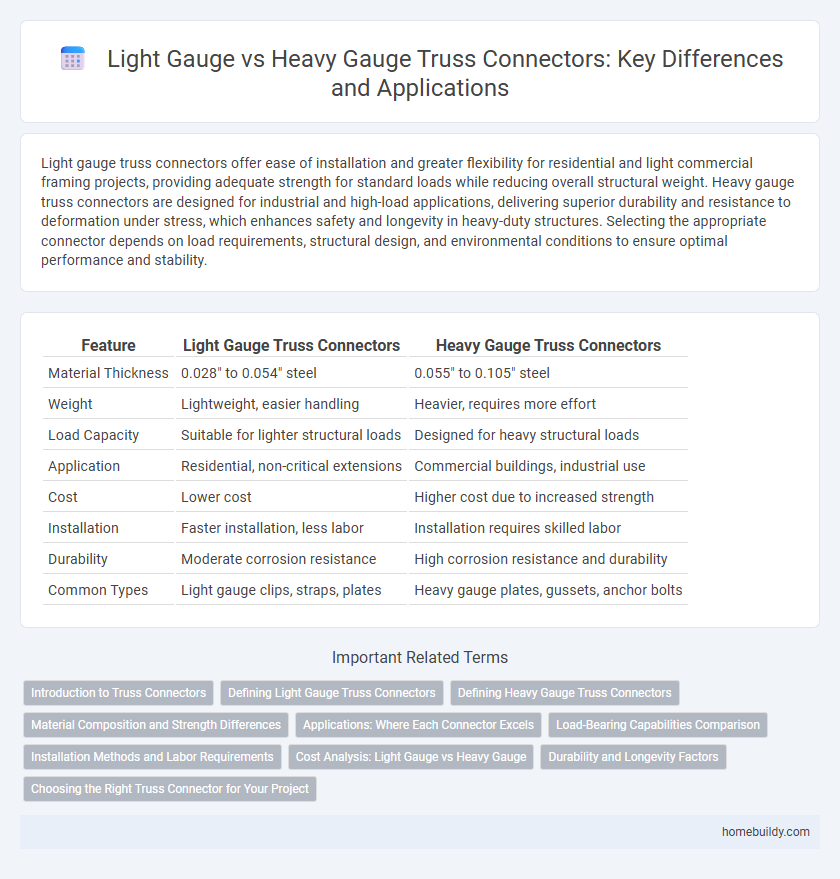Light gauge truss connectors offer ease of installation and greater flexibility for residential and light commercial framing projects, providing adequate strength for standard loads while reducing overall structural weight. Heavy gauge truss connectors are designed for industrial and high-load applications, delivering superior durability and resistance to deformation under stress, which enhances safety and longevity in heavy-duty structures. Selecting the appropriate connector depends on load requirements, structural design, and environmental conditions to ensure optimal performance and stability.
Table of Comparison
| Feature | Light Gauge Truss Connectors | Heavy Gauge Truss Connectors |
|---|---|---|
| Material Thickness | 0.028" to 0.054" steel | 0.055" to 0.105" steel |
| Weight | Lightweight, easier handling | Heavier, requires more effort |
| Load Capacity | Suitable for lighter structural loads | Designed for heavy structural loads |
| Application | Residential, non-critical extensions | Commercial buildings, industrial use |
| Cost | Lower cost | Higher cost due to increased strength |
| Installation | Faster installation, less labor | Installation requires skilled labor |
| Durability | Moderate corrosion resistance | High corrosion resistance and durability |
| Common Types | Light gauge clips, straps, plates | Heavy gauge plates, gussets, anchor bolts |
Introduction to Truss Connectors
Light gauge truss connectors, typically made from 18 to 20 gauge steel, offer flexibility and ease of installation for residential and light commercial framing projects. Heavy gauge truss connectors, constructed from thicker steel such as 12 to 16 gauge, provide superior strength and durability essential for industrial applications and heavy load-bearing structures. Choosing the appropriate truss connector depends on structural requirements, load capacity, and environmental conditions.
Defining Light Gauge Truss Connectors
Light gauge truss connectors are engineered from thinner steel sheets, typically measuring between 18 and 22 gauge, to provide lightweight yet strong connections in roof and floor truss systems. These connectors optimize material usage by balancing durability with flexibility, making them ideal for residential and light commercial construction where weight saving is crucial. Their design emphasizes corrosion resistance and ease of installation while maintaining sufficient load-bearing capacity for standard framing applications.
Defining Heavy Gauge Truss Connectors
Heavy gauge truss connectors are structural components made from thicker, more robust steel designed to handle greater loads and provide enhanced durability in building frameworks. These connectors are essential for supporting heavy roof trusses or floor systems where increased strength and resistance to bending or deformation are critical. Their superior load-bearing capacity and resistance to environmental stress make heavy gauge connectors ideal for commercial or industrial construction projects requiring long-lasting structural integrity.
Material Composition and Strength Differences
Light gauge truss connectors are typically made from thinner steel sheets, such as 18 to 22 gauge, providing sufficient strength for residential and light commercial applications. Heavy gauge truss connectors utilize thicker steel, often between 12 to 16 gauge, offering enhanced load-bearing capacity and superior resistance to deformation under heavy structural loads. The material composition directly affects the tensile strength, with heavy gauge connectors exceeding the strength of light gauge options by up to 50%, making them suitable for industrial and high-stress environments.
Applications: Where Each Connector Excels
Light gauge truss connectors are ideal for residential and light commercial projects, where ease of installation and flexibility are paramount, supporting roof and floor trusses in wood framing efficiently. Heavy gauge truss connectors excel in industrial and large-scale commercial constructions, providing superior strength and durability for steel truss systems subjected to higher loads and stresses. Selecting the appropriate connector depends on the structural demands, material compatibility, and specific project requirements, ensuring optimal performance and safety.
Load-Bearing Capabilities Comparison
Light gauge truss connectors are typically made from thinner steel, providing sufficient load-bearing capacity for residential or light commercial projects with moderate structural demands. Heavy gauge truss connectors, constructed from thicker steel, offer significantly higher load-bearing capabilities suited for industrial buildings or heavy-load applications requiring enhanced strength and durability. The choice between light and heavy gauge truss connectors directly impacts the overall structural integrity and safety of the truss system under varying load conditions.
Installation Methods and Labor Requirements
Light gauge truss connectors typically feature simpler installation methods involving fewer fasteners and often accommodate hand tools, reducing labor time and skill requirements. Heavy gauge truss connectors demand more robust fastening systems, such as higher-grade nails or bolts, and may require specialized equipment or skilled labor to ensure structural integrity. The labor intensity and installation complexity for heavy gauge connectors generally result in higher costs and longer project durations compared to light gauge options.
Cost Analysis: Light Gauge vs Heavy Gauge
Light gauge truss connectors offer a cost-effective solution due to lower material and manufacturing expenses, making them ideal for projects with budget constraints. Heavy gauge truss connectors, while more expensive upfront, provide superior strength and durability, reducing long-term maintenance and replacement costs. The choice between light and heavy gauge ultimately depends on the load requirements and lifecycle cost considerations of the construction project.
Durability and Longevity Factors
Light gauge truss connectors, typically made from thinner steel, offer adequate strength but may be more susceptible to corrosion and fatigue over time compared to heavy gauge options. Heavy gauge truss connectors, constructed from thicker and stronger steel, provide enhanced durability and longer lifespan, especially in high-stress or outdoor environments. Factors such as coating type, environmental exposure, and load requirements significantly influence the longevity of both light and heavy gauge truss connectors.
Choosing the Right Truss Connector for Your Project
Light gauge truss connectors are ideal for residential and light commercial buildings due to their affordability and ease of installation, providing sufficient strength for moderate loads. Heavy gauge truss connectors offer enhanced durability and superior load-bearing capacity, making them suitable for large-scale or industrial projects with rigorous structural demands. Selecting the right truss connector depends on factors such as the load requirements, environmental conditions, and project scale to ensure optimal performance and safety.
Light gauge truss connectors vs heavy gauge truss connectors Infographic

 homebuildy.com
homebuildy.com